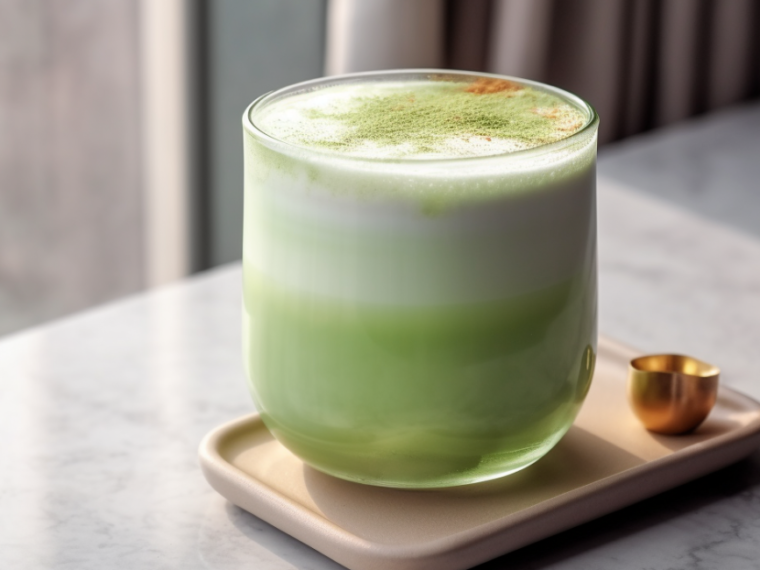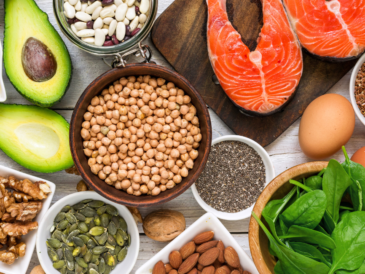Are you a Matcha traditionalist or do you love to experiment with your green tea? But did you know the type of milk you add can significantly impact this green elixir’s health benefits? Here’s everything you need to know about how dairy, coconut, soy, almond, and oat milk can affect your beloved Matcha.
1. Dairy Milk: The Classic Choice with a Twist
Matcha’s antioxidants can become less effective if you use dairy milk because of its casein proteins. Although dairy has the benefit of enhancing flavor and adding additional beneficial nutrients like calcium and vitamin D, it is also higher in calories and is not suitable for people with a lactose intolerance. So if you want to stay away from gassy winds or keep your windows closed at night, try one of the alternatives below!
- Antioxidants: N (Negative)
- L-Theanine: P (Positive)
- Nutrients Added: Calcium, Vitamin D, Protein, B Vitamins
- Flavor & Enjoyment: P (Positive)
- Caloric Content: N (Higher)
- Allergen Suitability: N (Dairy)
2. Coconut Milk: Tropical Goodness
Unlike dairy, Coconut milk preserves matcha’s antioxidants and adds healthy fats, next to a variety of vitamins. It also gives it a creamy, tropical and slightly sweet flavor. Because it tastes sweeter, you don’t need to use any sweeteners or syrups. We definitely call the need for less added sugars an extra benefit.
Cons: It is higher in calories compared to other milk alternatives, which might be a disadvantage for those monitoring their calorie intake. However, coconut milk does make you feel full longer, so it could stop you from reaching for a snack when you are trying to limit those.
- Antioxidants: P (Positive)
- L-Theanine: P (Positive)
- Nutrients Added: Healthy Fats (MCTs), Vitamins C, E, B1, B3, B5, B6, Iron, Selenium, Magnesium
- Flavor & Enjoyment: P (Positive)
- Caloric Content: N (Higher)
- Allergen Suitability: P (Non-Dairy)
3. Soy Milk: Protein Power
Similar to dairy, soy milk can reduce antioxidant absorption, but it can also add protein and essential nutrients. It is low in calories and does enhance the taste of matcha, making it sweeter. Soy milk is therefore a good choice for many, except for those who are allergic to soy.
- Antioxidants: N (Negative)
- L-Theanine: P (Positive)
- Nutrients Added: Protein, Calcium, Vitamin D, Vitamin B12, Riboflavin, Isoflavones
- Flavor & Enjoyment: P (Positive)
- Caloric Content: P (Moderate)
- Allergen Suitability: N (Soy)
4. Almond Milk: The Low-Calorie Nutty Alternative
Almond milk boosts matcha’s antioxidant benefits and adds vitamins E, D, and calcium. It is low in calories, which makes it perfect for those who are watching their intake. But be careful though, it is not suitable for people with nut allergies.
- Antioxidants: P (Positive)
- L-Theanine: P (Positive)
- Nutrients Added: Vitamin E, Calcium, Vitamin D, Vitamin B12, Healthy Fats
- Flavor & Enjoyment: P (Positive)
- Caloric Content: P (Lower)
- Allergen Suitability: N (Nuts)
5. Oat Milk: The Balanced Choice
Oat milk preserves matcha’s antioxidants and adds fiber, vitamins, and minerals. It has a moderate calorie count and a slightly sweet flavor. But drinking oat milk on an empty stomach is not a great idea. It’s high in gluten and sugars, so it will make your blood glucose spike. If that’s something you are worried about, you could find a gluten-free version if needed.
- Antioxidants: P (Positive)
- L-Theanine: P (Positive)
- Nutrients Added: Beta-Glucans, Calcium, Vitamin D, Vitamin B12, Riboflavin
- Flavor & Enjoyment: P (Positive)
- Caloric Content: P (Moderate)
- Allergen Suitability: P (Gluten-Free if Certified)
| Item Affected | Dairy Milk | Coconut Milk | Soy Milk | Almond Milk | Oat Milk |
|---|---|---|---|---|---|
| Antioxidant Absorption | N | P | N | P | P |
| L-Theanine Absorption | P | P | P | P | P |
| Added Nutrients | P | P | P | P | P |
| Flavor and Enjoyment | P | P | P | P | P |
| Caloric Content | N (higher) | N (higher) | P (moderate) | P (lower) | P (moderate) |
| Allergen Suitability | N (dairy) | P | N (soy) | N (nuts) | P (gluten-free if certified) |
One major benefit of Matcha: The Magic of L-Theanine
L-theanine is an amino acid found abundantly in matcha. It promotes relaxation without drowsiness, making it a perfect companion for focus and calm. This is particularly beneficial for those with ADHD, as L-theanine can enhance attention and reduce stress. Combining L-theanine with caffeine, as found naturally in matcha, creates a state of relaxed alertness, often referred to as “calm focus.”
How Much Matcha Can You Drink?
1-2 cups of matcha per day can give most adults a significant boost in antioxidants, sharpen focus, and keep them cool without crashing on the caffeine. However, it is important to be aware of your intake, especially if you are pregnant or trying to get pregnant. Matcha contains caffeine, and it is not recommended to drink a lot of it during pregnancy. Talk to your doctor or gynecologist about the appropriate amount for your situation.
Share this guide with your fellow matcha enthusiasts and let them discover their perfect match(a)!
Like this article? Subscribe for more health and wellness tips! Share your favorite matcha recipes and milk pairings in the comments below!
Source:
Benefits of L-Theanine: https://www.ncbi.nlm.nih.gov/pmc/articles/PMC8794723/





